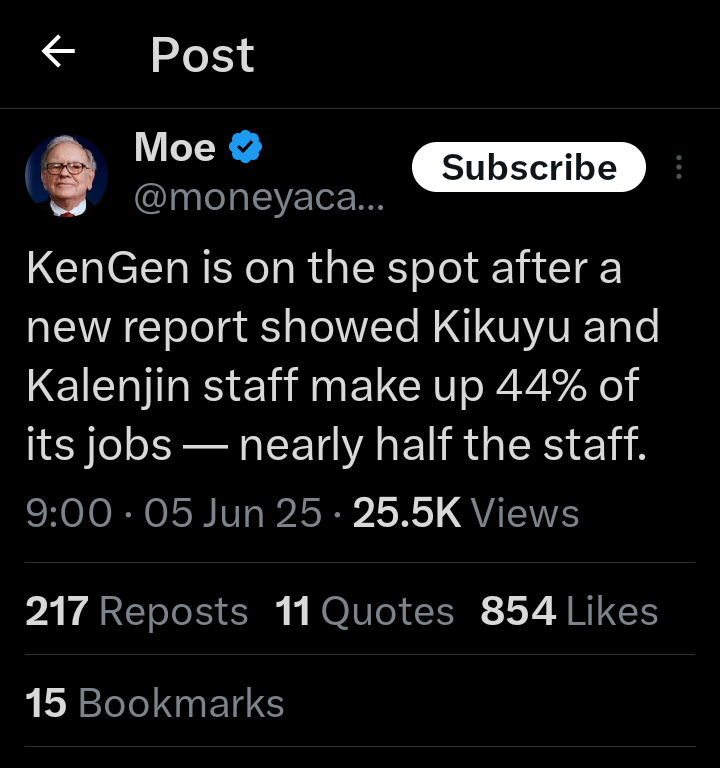Kenya Electricity Generating Company, commonly known as KenGen, is one of the largest and most important government-owned companies in Kenya. It is responsible for producing about 75 percent of the country’s electricity using different sources like hydro, geothermal, and wind energy.
Because of its size and public role, how it hires people and treats workers is always under public watch. A recent report presented to the National Assembly Committee on National Cohesion and Equal Opportunity shows that KenGen’s workforce may not reflect Kenya’s ethnic diversity fairly.
The findings reveal that two ethnic groups, Kikuyu and Kalenjin, make up 44.3 percent of the total employees at KenGen. To be exact, 26.8 percent are Kikuyu and 17.2 percent are Kalenjin. This is higher than their national population percentages, where Kikuyu represent about 17 percent and Kalenjin around 13 percent. This suggests that these two groups are over-represented at KenGen, raising questions about fairness and equal opportunity in hiring practices.
This issue is especially important in Kenya, which has more than 40 ethnic communities. The country’s constitution and public service rules say that all communities should get a fair chance when it comes to public jobs.

According to the diversity policy from the Public Service Commission, any ethnic group is considered over-represented if its share of jobs in a public institution is more than its national population percentage.
So, with Kikuyu and Kalenjin both going above this threshold at KenGen, concerns are growing about whether the hiring process is fair to all communities.
KenGen’s Managing Director, Peter Njenga, has responded by admitting the imbalance and saying that steps are being taken to address the issue. However, he has not provided clear details about what is being done or how soon changes will be made.
This lack of information has caused worry among Kenyans, especially on social media platforms like X, where many users have expressed frustration and demanded better inclusion for all groups.
Some users shared that while the representation of Kikuyu and Kalenjin may have reduced slightly compared to previous years, the current numbers are still far from balanced..
It is also worth noting that other communities such as the Luo and Maasai are slightly over-represented, but many smaller tribes, including the Dorobo, Orma, and Nubi, are almost completely left out, with only one or two people employed.
This shows that the problem goes beyond just two tribes and points to a larger issue of how jobs are distributed in state corporations.
The Kenyan public wants merit to be balanced with inclusivity, meaning that while qualifications and experience matter, diversity should also be respected to promote national unity.
The concerns at KenGen are not happening in isolation. Many government bodies and state-owned companies have faced similar criticism in the past. This is why the public continues to push for more transparency in hiring processes and regular reporting on staff composition.
As a country that has seen ethnic tensions before considering the 2007/8 post election violence, it is important for institutions like KenGen to lead by example in showing fairness and balance.
KenGen’s current workforce makeup has brought to light serious questions about ethnic representation and fairness in public sector jobs.
With nearly half of the company’s jobs going to just two communities, the company must do more to ensure its employment practices reflect the face of the nation.
Dear readers in your own opinion what do you think or what suggestions may you have to help address this issue?
Keep up with our social media handles for more timely updates.





















Add Comment